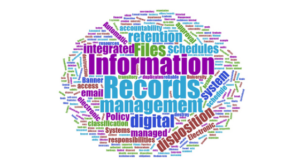WHAT IS RECORD AND INFORMATION MANAGEMENT

Before we can talk about why it’s important to have a records management program we need to provide an understanding of what Records and Information Management is.
Some people have the mistaken impression that records management is about hoarding everything that comes across one’s desk in the course of doing business. In some highly regulated industries it may seem like that is the case. But in most cases it’s not only making sure that what needs to be kept as a record is retained but it’s also about prescribing how long it should be kept, where it should be stored, who has access to it and when it should be destroyed (if ever).
For example, every business should be keeping a prescribed set of records in order to meet IRS auditing standards. This means that your general ledgers, receipts for expenses, and many other financial documents need to be retained for anywhere from 7 to 10 years. Many small businesses incorrectly believe that the IRS is more likely to audit large corporations than smaller enterprises. On the contrary – according to the Transactional Records Clearinghouse (TRAC) of Syracuse University, audit rates for the largest corporations with assets of $250 million or more have decreased from 64% in 1988 to 27% in 2008. In turn, companies with $10 million to $50 million in assets were 29% more likely to be investigated.
Not having an up-to-date records retention program can mean lots of time and money expended to find the required records. Some small companies can spend thousands of dollars and significant time to respond and close out an IRS audit because they haven’t prepared for this eventuality.
But, having a fully functional records management program isn’t just about keeping records for a prescribed period of time – it’s about following the lifecycle of a record, from its creation to active use, maintenance, inactive use and disposition; whether that disposition is for long term storage or destruction.
HOW TO FILE RECORDS IN AN ORGANIZATION
Every Organization chooses the pattern of filling its records. This is because different organizations generate and use different types of records for which its filling style may certainly be specific and unique.
However, in most organizations records are filled in five major ways namely:
- Alphabetical order
- Subject order
- Geographical arrangement
- Chronological filing order
- Numeric filing pattern
WHY RECORDS MANAGEMENT IS AN IMPORTANT FUNCTION OF YOUR BUSINESS
See Also THE POSITION UNDER THE LABOUR LAW STATUTES
In order to prevent having to deal with the consequences of records problems, a solid records management plan needs to be in place in all organizations – both big and small.
Respond To Audits and Discovery Requests in an Organized and Compliant Fashion
Having a well-managed records management program in place makes responding to stressful events such as IRS audits less costly and time consuming. How much more does it cost you when you show up with a box of receipts at a tax preparer’s office versus having an itemized list of receipts, receipts organized by account and everything in order? The cost difference can be significant. Now magnify that by all the different records and accounts you have to support your business. Just the perception of disorganization will give an auditor pause and make the process take longer.
Save Money With Respect To Finding and Storing Records and Information
Records management practices help you to identify what information is important to keep, how long to keep it and when to securely destroy it. Holding on to everything takes up valuable real estate and office space. Holding on to everything may also subject the company to unnecessary litigation when documents are retained beyond their required life. Are you running out of space in your office? Are your employees constantly looking for information that they can’t find – both on their desks and on their computers? How much money is that costing the company?
Summary
A records and information management program is a requirement for all businesses. Without one in place a company is in danger of running afoul of the law and could be at risk of going out of business if a catastrophe strikes. Good records and information management also hinges on sound legal understanding and viable ethical values. This will help to regulate and monitor records acquisition, storage, retention, use and destruction. It is important to state here that viable records and information management must ensure that records and information get to the right users at the right time and in the format that the appreciate.